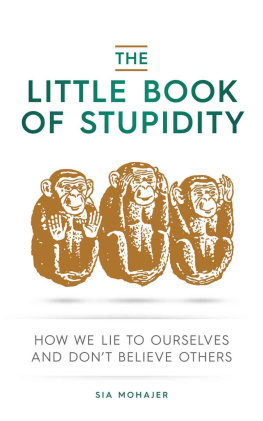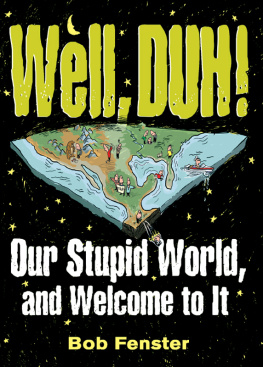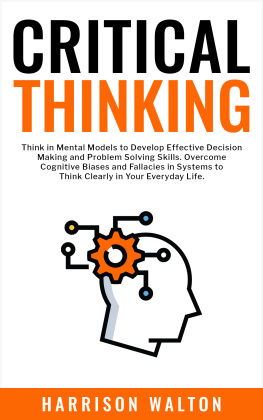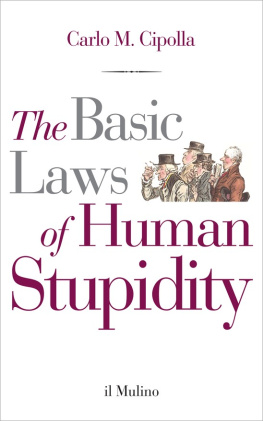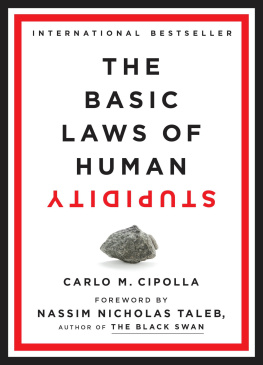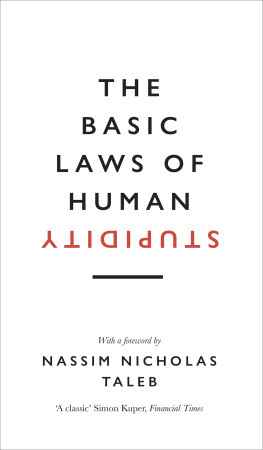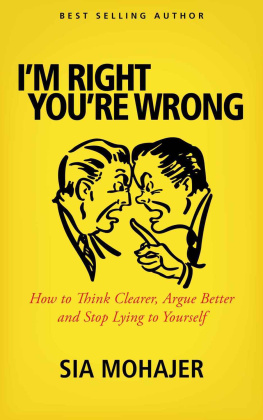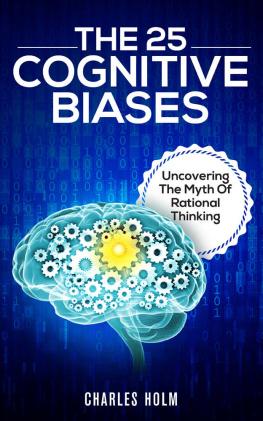The Little Book of Stupidity
Sia Mohajer
The Little Book Of Stupidity
Copyright 2015 by Sia Mohajer
All rights reserved. No part of this publication may be reproduced, stored in retrieval system, copied in any form or by any means, electronic, mechanical, photocopying, recording or otherwise transmitted without written permission from the publisher. You must not circulate this book in any format.
Contents
Hello Mr. Wheeler
On a beautiful Pittsburgh morning in 1995, McArthur Wheeler decided to rob a bank. Not just one bank but two. He chose two large banks located downtown: Fidelity Savings Bank and a Mellon Bank. McArthur had a secret plan; one that he thought would make him exceptionally successful. It involved something very soura lemon.
McArthur had just recently discovered invisible ink. Lemon juice, a substance commonly used in elementary science class, is invisible when used as ink on paper. It only becomes visible when its heated. Unfortunately for McArthur, his ingenious plan involved covering his face in lemon juice and then robbing the banks. The fact that his face was not made of paper didnt discourage McArthur in his belief that some lemon juice on his face would make him invisible to all the surveillance cameras. Unsurprisingly, several hours after the two robberies, McArthur was in custody. To his astonishment, his plan was unsuccessful. He even protested to detectives, But I wore the juice.
McArthur had apparently tested his theory before proceeding with his ingenious robberies. In an interview with Sergeant Wally Long, he explained that he had covered his face with lemon juice and used a Polaroid camera to take a picture of himself before the robbery. The picture didnt come out, which was taken as a solid confirmation of this theory. Sergeant Wally Long later speculated that McArthur used bad film or that he had put so much lemon juice into his eyes he wasnt able to use the camera correctly.
Mr. Wheeler's story almost seems fake. How could any human think that he alone had discovered a magic recipe for being invisible; a secret that had been lying under the noses of all humanity in the form of elementary science experiments.
I bring up the story of the amazing Mr. Wheeler to make three points. The first is that all areas of life, success and satisfaction depend on knowledge, wisdom and knowing which rules to follow. This is not only true for violations of the law but also for tasks in social and intellectual domains. This includes areas such as raising children, working, leadership, study and constructing rational arguments. The second is that people differ widely in their knowledge and the strategies they apply in different domains. Each strategy contributes to a varying level of successwith Mr. Wheeler being a particularly poignant example. Some of the knowledge and theories people apply to their actions are sound and produce favorable results. Others, like the lemon juice hypothesis of McArthur Wheeler, are totally wrong, incompetent and sometimes just plain stupid.
Engaging in actions, which we might consider stupid later on is normal. Our personalities and values are not static entities and a future self may look down upon actions of the past. However, what about the people who fail to see that what they are doing is stupid? This brings me to my third point.
When people are incompetent in the strategies they adopt to achieve success, they suffer a dual burden. They not only make mistakes that others may deem stupid but their incompetence robs them of the ability to comprehend it. Instead, they are left with the erroneous impression, like Mr. Wheeler, that their actions are acceptable and potentially ok.
David Dunning and Justin Kruger
The inspirational story of Mr. Wheeler came to the attention of two Cornell University professors: David Dunning and Justin Kruger. They found the story so compelling that they decided to engage in a series of related experiments. Dunning and Kruger believed that ignorance of standards of performance lie behind a great deal of incorrect self-assessments of competence. Their experiments ranged from operating vehicles to playing tennis. Their research showed that for any given skill, incompetent people generally fail at four key points. They fail to recognize their own ability or skill level. They fail to understand and recognize the skill in others. They fail to understand the level of their incompetence. Finally, they fail to recognize their own lack of the skill, even after they are exposed to training for that skill.
They called it the Dunning Kruger Bias and its been widely studied. It has been found to affect people in all walks of life with some frightening implications. From law to medicine, history is replete with examples of the Dunning Kruger Bias. However, it is not the only example of stupidity quantified by science. There are others.
Enter The Godfather of Biases: Daniel Kahneman
Since the early 1970s, Nobel Prize winning American psychologist Daniel Kahneman has been working hard to understand why we make the mistakes we do. Along with several colleagues, most notably Amos Tversky, he has conducted a multitude of experiments that chronicle all the ways in which we can be stupid.
A bias, put simply, is a systematic pattern of deviation from the norm in judgment. This deviation causes people to make inferences about other people and situations in a highly illogical fashion. People create their own reality from selective input. They dont see the whole picture but rather only selected portions of it. It is not the reality of the situation that dictates an individuals behavior but rather his constructed subjective-social reality. This is the cause of all manner of cognitive biases.
The most interesting part of Kahneman's findings were not how pervasive biases were but rather how adaptive they were. In many contexts, cognitive biases may lead to more effective actions. In situations where time is more important than accuracy, biases serve as powerful rules of thumb. These rules of thumb were later called heuristics, or mental shortcuts. The resulting conclusion is powerful; cognitive biases are a natural result of human processing limitations resulting in limited information processing or, in many cases, lack of appropriate logic.
Basically the research has shown that bias play a fundamental role in allowing us to navigate the world more easily. They provide a sense of meaningful blindness in order to create a reality that can be more easily understood. The example of Mr. Wheeler stands as an extreme example of an otherwise daily human system.
Our Constructed Reality: The Movie of You
We are never sure what we really want, and at times, our whole existence seems like an elaborate self-constructed play. Our lives are a constantly intertwining and morphing narrative that ebbs and flows like a river adjusting itself to every context. Each of us is a storyteller whether we know it or not. Our subjective reality is constructed within our minds regardless of what is happening outside.
This book is about the rift between reality and perception. In many ways, they exist as two separate entities only rarely skimming across the surface of each other. Why are they so distant? The reason is simple. You are a story. Your life is a story. Everything you do fits into that story. Within that story, we have a character.
This isnt some random idea I just came up with; rather, its a well-supported theory of psychology. Its called self-perception theory. It goes a little something like this, people determine their attitudes and preferences by interpreting the meaning of their own behavior. Our behaviour has to fit somewhere, and that somewhere is our ever-changing, ever-so-adaptable narrative story about who we are.
Next page
